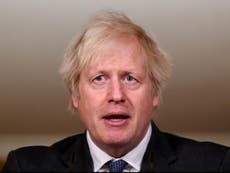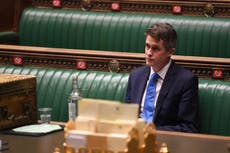Covid: Tories revolt as government fails to guarantee school reopenings by Easter
‘Closed schools increases inequality, exposes the most vulnerable, and creates gaps that cannot be filled,’ Tom Tugendhat says
Your support helps us to tell the story
From reproductive rights to climate change to Big Tech, The Independent is on the ground when the story is developing. Whether it's investigating the financials of Elon Musk's pro-Trump PAC or producing our latest documentary, 'The A Word', which shines a light on the American women fighting for reproductive rights, we know how important it is to parse out the facts from the messaging.
At such a critical moment in US history, we need reporters on the ground. Your donation allows us to keep sending journalists to speak to both sides of the story.
The Independent is trusted by Americans across the entire political spectrum. And unlike many other quality news outlets, we choose not to lock Americans out of our reporting and analysis with paywalls. We believe quality journalism should be available to everyone, paid for by those who can afford it.
Your support makes all the difference.Conservative MPs have heaped pressure on the government to get children in England back to school as quickly as possible after the health secretary warned any return may be pushed back beyond the Easter break.
Schools have been off limits to most since the beginning of the year, with only vulnerable pupils and the children of critical workers allowed to attend to limit the spread of the coronavirus.
While the government never set a formal end to the restriction, Boris Johnson said at the start of January he hoped to see schools begin to reopen “after the February half term”.
However, Tory politicians have urged the government to make the resumption of face-to-face teaching a priority after Matt Hancock warned that pupils may have to continue to learn remotely until April – with this year’s Easter half term due to end on the 16th of the month.
Mr Hancock said that while he hoped schools in England could reopen by Easter, it would depend on the levels of infection in the community at that time.
“We have got to look at the data, we have got to look at the impact of the vaccination programme,” he told Sky News.
“The education secretary has said that we will ensure schools get two weeks’ notice of return. I don’t know whether it will be then or before then. We have got to watch the data.”
As recently as Thursday Gavin Williamson had said that he hoped schools would be able to reopen before the April break – although Downing Street pointedly declined to endorse his comments.
Tory MPs responded to the prospect of continued school closures by heaping pressure on the government to speed up the return to school, with education committee chair Robert Halfon demanding clarity on when in-person teaching would resume.
Mr Halfon, who has written to the speaker of the house to force a response from the Department for Education, urged the government to produce “a routemap out of coronavirus to get children learning again at school".
Describing the possibility of closures lasting into April as “grim news” for parents and pupils, he wrote on Twitter: “We need to get our children learning again. The engine of government should be directed towards opening our schools. We face an epidemic of educational poverty and mental health otherwise.”
Mark Harper, who has previously opposed large-scale lockdowns in favour of a tiered approach, told BBC Radio 4’s Today programme that restrictions should be eased two to three weeks after the four priority groups have been vaccinated next month.
“At that point you need to start bringing the economy back to life, and the first thing that needs to be reopened are our schools so our children can get back, mix with their friends, and enable their education and their social development to take place. What we are asking for now is the government to set out that plan and bring some clarity.”
Tom Tugendhat, chair of the Foreign Affairs Committee, said: “Closed schools increases inequality, exposes the most vulnerable, and creates gaps that cannot be filled. We must open schools as soon as possible.”
Esther McVey, the former work and pensions secretary, said vaccines should be offered to teachers as a matter of urgency to ensure a safe and swift return to classrooms.
“Schools need to reopen for the child’s best interest and for families too”, she said.
“If vaccinating teachers, after the most vulnerable in society, removes the barriers to reopening schools then we should do it. You can’t close schools and not have a workable alternative”.
The Children’s Commissioner for England Anne Longfield added that schools should open “as soon as possible” and urged the government to set out the progress being made towards reopening classrooms at a No 10 press conference.
“Children are more withdrawn, they are really suffering in terms of isolation, their confidence levels are falling, and for some there are serious issues,” she said.
“This is something for which families around the country will need hope and clarity about what comes next, and that of course is what the speculation we're hearing really feeds into - that confusion - but also worry about where they as a family go from here.”
Mr Hancock said on Sunday that educators have a “good shout” when it comes to being high on the coronavirus vaccine priority list once the most clinically vulnerable have received their jabs.
So far, along with the over 70s and the clinically extremely vulnerable, the only workforces to be prioritised for jabs have been those in health and social care.
Across the country more than 6.3 million people have been given the first dose of a vaccine as of Saturday, making up 9.5 per cent of the UK population.
“The challenge is the supply of vaccine, supply is the rate-limiting factor," said Mr Hancock.
“The question is who should have each dose as it comes in… and we’ve taken the decision, quite rightly, to go through in order of clinical need, starting with those who are most likely to die from this disease.
“Of course we want to break the chains of transmission but we’ve also got to stop people dying from the disease if they catch it.
“We’re going through those who are clinically vulnerable… and after that there’s a perfectly reasonable debate to be had about who should go in what order next.
“Teachers have got a good shout to be very high on the list and those discussions are going on.”





Join our commenting forum
Join thought-provoking conversations, follow other Independent readers and see their replies
Comments